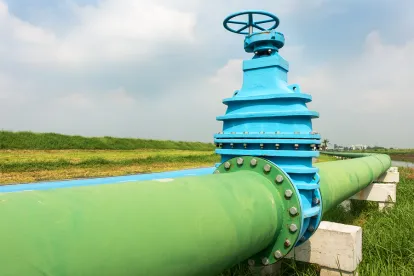On June 4, 2020, the Massachusetts Attorney General’s Office (AGO) filed a Petition requesting the Massachusetts Department of Public Utilities (DPU) to open an investigation into potential changes to natural gas distribution operations to support the Commonwealth’s legislatively mandated greenhouse gas (GHG) emission limit reductions (the Petition).
Specifically, the AGO’s Petition seeks to evaluate the industry, regulatory, and policy adjustments that are requisite to meet state GHG limits, and to “determine what near and long-term adjustments are necessary to maintain a safe and reliable gas distribution system and protect consumer interests as the Commonwealth transitions” to carbon neutrality by 2050.
Shortly after the filing with the DPU, on July 21, the AGO rejected a municipal by-law passed by the Town of Brookline, which effectively banned the installation of oil and gas pipes in new and substantially renovated buildings. The Brookline by-law was passed in a near-unanimous vote of more than 200 Town Meeting members, and sought to eliminate what was described as an estimated two-thirds of the town’s greenhouse gases. The AGO, however, determined the Brookline by-law was preempted by the State Building Code, despite its purported alignment with State policy to reduce GHG emissions. As stated by the AGO in its July 21 decision, “[i]f we were permitted to base our determination on policy considerations, we would approve the by-law.”
The AGO’s Petition to the DPU follows a similar proceeding begun in March by the New York Public Service Commission (the Commission) titled, Proceeding on Motion of the Commission in Regard to Gas Planning Procedures. CASE 20-G-0131 (the Proceeding). Similar to the AGO’s Petition, the purpose of the Proceeding is to consider issues related to gas distribution utilities’ planning procedures to transition from natural gas as the primary heating and electrification fuel.
The central question presented by the state proceedings, however, is how do states continue to meet and address the needs of communities to maintain safe, affordable and reliable energy while they simultaneously pursue net-zero emissions? New York City, for example, has already faced the difficulties of any such moratoriums on gas systems.
As indicated in both the Petition and the Proceeding, there are no easy answers to address issues created by measures designed to shift from natural gas, which provides reliable heating and electricity for the majority of the homes and businesses in the subject states. Enactments such as the by-law invalidated by the AGO have different impacts in different communities based on income levels. Collectively, these state actions highlight the challenges states will encounter in attaining net-zero carbon emissions by 2050, and the very important, yet difficult to reconcile dynamic, with the maintenance of reliable, safe and affordable energy generation and distribution systems.
Massachusetts AG Petition
The AG’s Petition states the requested investigation by the DPU will afford the opportunity to solicit utility and stakeholder input to “develop a nation-leading regulatory and policy roadmap to guide the evolution of gas distribution industry companies, provide ratepayer protection and allow the Commonwealth to move into its net-zero GHG emissions energy future.” In addition to the statutory and regulatory requirements that have been established since the Global Warming Solutions Act (GWSA) and Green Communities Act of 2008, the Petition’s focus on gas distribution comes two years after a series of gas explosions that occurred in the Merrimack Valley.
In a concurrently issued statement, Massachusetts Attorney General Maura Healey stated, “[i]n order to combat the climate crisis and meet our clean energy goals, we must transition away from fossil fuels and change the way gas utilities do business in our state. We want the DPU to take a close look at the future of the natural gas industry in Massachusetts and make the policy and structural changes we need to ensure a clean energy future that is safe, reliable, and fair.”
The AG’s Petition offers that the investigation should occur in two phases. In phase one, the DPU would direct the local distribution companies to submit detailed economic analyses and business plans depicting future gas demand in a carbon-constrained economy, as well as probable revenues, expenses, and investments. The companies also would identify the “challenges that a substantially decarbonized economy creates for [the companies] and present ideas and solutions for both near and far-term future,” as the state moves towards carbon neutrality. The initial phase also would provide for the necessary stakeholder inputs on associated regulatory, policy and legislative directives that may be presented to facilitate the GHG emissions mandates.
Phase two of the investigation would seek development and implementation of the “necessary policy, business and regulatory pathways to achieve the Commonwealth’s climate change mandates and protect the Commonwealth’s gas consumers.” Through this phased approach, the AG asks the DPU to focus on three subject items during its investigation: 1) Ratepayer Protection, Equity and Fairness; 2) Planning, Forecast and Supply, and 3) Capital Investments.
-
Ratepayer Protection, Equity and Fairness
The AG’s Petition urges the DPU to consider steps to ensure that low-income customer rates remain affordable as gas companies’ revenue requirements are spread over a shrinking customer base. The DPU also should consider policy measures to assist low- to moderate-income customers to transition their homes to clean energy.
-
Planning, Forecast and Supply
The AG’s Petition suggest the DPU’s investigation should consider whether the Department needs to adjust its guidelines for reviewing gas companies’ forecast and supply plans to require additional data about transitioning away from natural gas as a heating fuel and for meeting future demand through demand response, energy efficiency, or other carbon-neutral options.
-
Capital Investments
According to the Petition, the DPU should examine the investment needed to ensure a safe and reliable gas system over the next 30 years, while gas demand declines. The AG’s Office also urges the DPU to examine whether there are other cost-effective alternatives to traditional gas infrastructure investment that may align better with the state’s climate goals.
Although the DPU has set a docket for the Petition, D.P.U. 20-80, it has not yet taken action to open the investigation. The Petition follows on similar actions taken in California and New York. In 2019, the California Energy Commission approved new local building requirements against gas in five cities and one county across the state. Similar to California, the New York State Public Service Commission recently announced a review of current gas supply planning protocols, as the state pursues ambitious goals to mitigate climate change.
New York State Proceeding
On March 19, 2020, the Commission issued an order instituting a Proceeding on Motion of the Commission in Regard to Gas Planning Procedures. CASE 20-G-0131 (the Proceeding). The purpose of the Proceeding is to consider issues related to gas distribution utilities’ planning procedures.
According to the Commission, the Proceeding derives from claims of supply constraints from gas utilities in differing regions of New York State. These supply constraints involve, in turn, the potential prevention of gas utilities from accepting new firm service applications, the possible need to invoke a moratorium on new service connections, and other steps to manage the supply constraint. Moreover, the Commission is mindful of the requirements of New York’s recently enacted Climate Leadership and Community Protection Act, Chapter 106 of the Laws of 2019 (CLCPA), and how gas utility planning must now factor in these new requirements. Accordingly, the key topics of the Commission’s Proceeding include:
-
Examining Constraints
The Proceeding will study the causes of gas constraints, including: (a) a shortage of pipeline supply capacity; (b) inadequate distribution infrastructure to deliver available pipeline supply; or (c) a combination of these and other factors.
-
Gas Planning
The Proceeding calls for a proposal to modernize the gas planning processes to account for the CLCPA’s policy directions, minimize total lifetime costs, and one that is inclusive of stakeholders.
-
Non-Pipe Solutions
The Proceeding looks to evaluate non-pipe solutions like energy efficiency (EE), clean demand response, and temporary supply with an eye toward reducing or eliminating the need for gas infrastructure and investments.
-
Gas Moratorium Standards
The Commission’s order explains that existing utility tariffs differ regarding how a utility declares a moratorium on new customer additions, and the Proceeding will explore best practices and opportunities to improve these moratorium processes.
-
Demand-Side Resources
The Commission acknowledges that demand side resources like EE and electrification, whether authorized or under consideration by the Commission in separate proceedings, could be further informed by this Proceeding, so as to optimize the deployment of these resources.
For next steps, the Commission ordered the gas distribution utilities to make several filings, including: (a) a supply and demand analysis with regard to the locations in their respective service territories known to be vulnerable to supply constraints; (b) a supply and demand analysis with regard to that utility’s entire service territory; (c) a proposal for the peaking services and moratorium management issues; and (d) a status report and proposals regarding the utility’s current or anticipated use of demand reducing measures (e.g., EE, demand response, non-pipe alternatives), and other measures to address identified areas of supply/demand imbalance or to aid in the management of moratoria. Following and/or concurrently with these utility filings, the Commission directed Commission Staff to file a proposal to modernize the gas system planning process. This proposal is anticipated to be filed by Commission Staff on or about September 21, 2020.
This Proceeding in New York and the anticipated proceeding in Massachusetts will continue develop in the near term. The underlying state policy directives will have far-reaching impacts on a wide range of stakeholders going forward.





 />i
/>i

